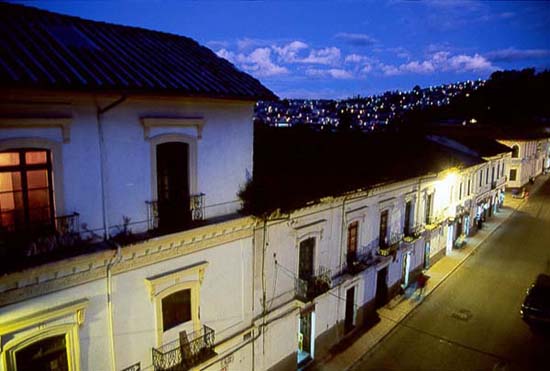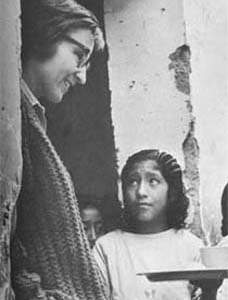May 2, 2005: Headlines: COS - Ecuador: Quechua: The UCLA Daily Bruin: Tim Wright said he became interested in Quechua when he was a peace corps volunteer in Ecuador during the late 1980s. When he returned to the United States he enrolled in the Latin American studies program at UCLA, and he studied Quechua with Daza from 1989-1991
Peace Corps Online:
Directory:
Ecuador:
Peace Corps Ecuador :
The Peace Corps in Ecuador:
May 2, 2005: Headlines: COS - Ecuador: Quechua: The UCLA Daily Bruin: Tim Wright said he became interested in Quechua when he was a peace corps volunteer in Ecuador during the late 1980s. When he returned to the United States he enrolled in the Latin American studies program at UCLA, and he studied Quechua with Daza from 1989-1991
Tim Wright said he became interested in Quechua when he was a peace corps volunteer in Ecuador during the late 1980s. When he returned to the United States he enrolled in the Latin American studies program at UCLA, and he studied Quechua with Daza from 1989-1991

Tim Wright said he became interested in Quechua when he was a peace corps volunteer in Ecuador during the late 1980s. When he returned to the United States he enrolled in the Latin American studies program at UCLA, and he studied Quechua with Daza from 1989-1991
It’s all Quechua to me
Only a handful of universities teach this native South American language
By Adam Foxman
DAILY BRUIN STAFF
afoxman@media.ucla.edu
In a small classroom on the 10th floor of Bunche Hall, Jaime Luis Daza speaks to his three graduate students in a language that is rarely heard in North American universities. In a deep and sonorous voice, Daza forms phrases from long strings of suffixes and his students answer him in kind.
The words build outward from basic roots and, as Daza put it, become "kilometric."
The root mikhu: to eat, for example, becomes mikhuni: I eat; mikhusani: I am eating; mikhusarqani: I was eating; and mikhusarqaniña: I was already eating.
Daza and his students are speaking Quechua, an indigenous language of the Americas that originated with the Inca empire.
UCLA is one of only a handful of universities in the United States – and the world – that offers a Quechua language program.
[Excerpt]
When Daza arrived at UCLA, he revived the university's dormant Quechua program with Anderson's help, and he has been teaching the language ever since – for more than 20 years.
Some of Daza's former students, like Tim Wright, a doctoral student in anthropology, have leveraged their knowledge of Quechua into careers.
Wright said he became interested in Quechua when he was a peace corps volunteer in Ecuador during the late 1980s. When he returned to the United States he enrolled in the Latin American studies program at UCLA, and he studied Quechua with Daza from 1989-1991.
He went on to get a master's degree in public health, and, partially thanks to his knowledge of Quechua, received a Fulbright grant and a grant from the InterAmerica Foundation to study health programs in a rural Quechua-speaking part of Bolivia.
Wright said speaking Quechua gave him access to aspects of Bolivian daily life.
"If you want to be really accepted, for them to understand that you really care about their lives, to speak their language makes an incredible difference," the Los Angeles native said.
Wright described one instance when he wanted to help with agricultural work, but it was more difficult and complicated than he expected. The locals explained the skills to him in Quechua, and he was able to participate in and discuss the daily routines that structured their lives.
When this story was posted in May 2005, this was on the front page of PCOL:
 | The Peace Corps Library
Peace Corps Online is proud to announce that the Peace Corps Library is now available online. With over 30,000 index entries in 500 categories, this is the largest collection of Peace Corps related stories in the world. From Acting to Zucchini, you can find hundreds of stories about what RPCVs with your same interests or from your Country of Service are doing today. If you have a web site, support the "Peace Corps Library" and link to it today. |
 | Friends of the Peace Corps 170,000 strong
170,000 is a very special number for the RPCV community - it's the number of Volunteers who have served in the Peace Corps since 1961. It's also a number that is very special to us because March is the first month since our founding in January, 2001 that our readership has exceeded 170,000. And while we know that not everyone who comes to this site is an RPCV, they are all "Friends of the Peace Corps." Thanks everybody for making PCOL your source of news for the Returned Volunteer community. |
Read the stories and leave your comments.

Some postings on Peace Corps Online are provided to the individual members of this group without permission of the copyright owner for the non-profit purposes of criticism, comment, education, scholarship, and research under the "Fair Use" provisions of U.S. Government copyright laws and they may not be distributed further without permission of the copyright owner. Peace Corps Online does not vouch for the accuracy of the content of the postings, which is the sole responsibility of the copyright holder.
Story Source: The UCLA Daily Bruin
This story has been posted in the following forums: : Headlines; COS - Ecuador; Quechua
PCOL20121
70
.
-Please circulate
‘Heroes Of Our Time Vote: the Top 50’
New Statesman Magazine Cover Story
During Spring 2006 the international politics/current affairs journal New Statesman conducted a vote among readers for the top 50 heroes of our time. The definition of a hero: ‘A man or woman whose actions have been in the service of the greater good and whose influence is national or international: someone who is prepared to act in pursuit of a freer, more equitable and democratic future, without recourse to violence’.
The New Statesman is similar to the US-based international magazine Newsweek.
Top of poll – Aung San Suu Kyi.
Plus UK post-conflict specialist also recognised in Top 50 Heroes of Our Time poll: see ‘Lesley Abdela’ below. More information on each name can be found on search engines such as Google.
See complete poll on www.newstatesman.com/200605220016
The response, published as the magazine’s cover story, is ‘as surprising in its range and unpredictability as it was overwhelming’ though the first three are to be expected, world figures Aung San Suu Kyi, Nelson Mandela and Bob Geldof. No. 49 is leading theoretical physicist Stephen Hawking, and No 50, Andrew Flintoff, famous English cricketer.
Quite a few respondents thought the magazine meant ‘people for our time’ rather than people alive and active now, so Winston Churchill, Jesus and Marie Curie received a good number of votes.
Of the 50 who topped the poll, 10 are female (20%).
Other women on the Top 50 list include American, Australian, Burmese, Irish and Russian.
Campaigners ranked significantly, hence Bob Dylan (37th) and Bono (30th), Aung San Suu Kyi (1st), Mordechai Vanunu (24th), Lesley Abdela (34th), Helena Kennedy (40th), Noam Chomsky (7th) and campaigning journalist John Pilger (4th).
Women voted into the top 50 Heroes of our Time:
Aung San Suu Kyi, Burmese pro-democracy campaigner (1st)
Margaret Thatcher, UK Prime Minister 1979-90 (5th)
Mary Robinson, Ethical Globalisation Initiative, former UN High Commissioner for Human Rights (20th)
Germaine Greer, Academic and Broadcaster, author of ‘The Female Eunuch’ (25th)
Queen Elizabeth 11, most travelled head of state in history (33rd)
Lesley Abdela, international Champion of Women’s Rights, specialist in ‘gender in post-deadly conflict reconstruction’ (Kosovo, Afghanistan, Iraq, Aceh, Sierra Leone) (34th) (lesley.abdela@shevolution.com)
Shami Chakrabarti, Civil liberties campaigner, Director of human-rights group Liberty (35th)
Anna Politkovskaya, Russian journalist reporting on Chechnya war (39th)
Helena Kennedy QC, leading British lawyer, especially on social justice (40th)
Toni Morrison, Pulitzer Prizewinner novelist on black America (48th)
Some of the men voted among the Top 50 heroes of our time (not in order) –
Amartya Sen, Nobel Laureate, writing on poverty, welfare and development (29th)
Bill Gates, Microsoft founder, with his wife Melinda one of the greatest philanthropists (8th)
Dalai Lama, Buddhist spiritual leader (9th)
Hans Blix, former UN weapons inspector (15th)
Tony Benn, former Cabinet Minister, veteran anti-war campaigner (12th)
Mikhail Gorbachev, last leader of the Soviet Union, relinquished power to help bring Cold War to an end (13th)
Tim Berners-Lee, Inventor of the worldwide web (28th)
Jimmy Carter, former US President, founder of the Carter Center, dedicated to alleviating poverty (41st)
Richard Dawkins, evolutionary theorist (26th)
Muhammad Yunus, Founder of Grameen Bank, ‘banker to the poor’ (22nd)
John Carr, international Internet safety expert, advises on protecting children from the dangers of the web (42nd)
Peter Tatchell, co-founder of OutRage, who attempted citizen’s arrest on Robert Mugabe (6th)
The New Statesman wrote: ‘Among those who just missed out from the final 50 were Roméo Dallaire, the stoical head of the United Nations peacekeeping force in Rwanda at the time of the genocide in 1994; Subcomandante Marcos, the philosopher-rebel and one of the leaders of the Zapatista liberation movement in Mexico; the CND activist Bruce Kent; the comedian and birdwatcher Bill Oddie; the young man who defied the Chinese during the Tiananmen Square revolt of 1989 - the "unknown rebel", as readers called him; and, oddly, the American blue-collar rocker Bruce Springsteen. I was surprised that Archbishop Desmond Tutu of South Africa did not make our top ten. He is such a brave and admirable person whose sense of compassion and forgiveness are defined by his faith. But perhaps when people think of bravery and moral courage in South Africa they think first, and inevitably, of Nelson Mandela.’
New Statesman magazine: tel. +44 20 7730 3444, fax +44 20 7259 0181 website: www.newstatesman.com e-mail info@newstatesman.co.uk
|
By Anonymous (84-12-21-106.dyn.gotadsl.co.uk - 84.12.21.106) on Wednesday, November 07, 2007 - 4:09 pm: Edit Post |
Gender/post-conflict specialist Lesley Abdela as high level, international gender adviser to UN and Nepali Government
Gender/post-conflict specialist Lesley Abdela will be resident in Kathmandu until March 2008 as high level, international gender adviser to United Nations’ Humanitarian programmes in Nepal. Lesley Abdela's work in Nepal is sponsored by the Norwegian Government/Norwegian Refugee Council. Her principal UN partner is the UNFPA. See search engines under 'Lesley Abdela post-conflict'. Contact abdela@un.org or lesley.abdela@shevolution.com
The United Kingdom gender/post-conflict specialist's work has included on-the-ground stints in Kosovo (OSCE), Aceh (IOM), Afghanistan (UNFPA) and Iraq (USAID) and Sierra Leone (DfID/British Council). She is widely recognised internationally for her gender/post-conflict reconstruction work and her advocacy for women's worldwide equality.
Norway and the Nordics have an unparalleled reputation in the global struggle for the advance of women. UNFPA has advocated that one of the cross-cutting strategic priorities for the UN Peace Strategy must be Gender. Lesley has worked with the UNFPA on previous occasions in West Africa, Afghanistan, Indonesia and Turkey. In Kathmandu she is working from the office of the chief UN Humanitarian and Resident Coordinator.
The Common Country Assessment notes Gender discrimination is one of the root causes of almost all development challenges. The UN has more humanitarian programmes in Nepal than any other country.
Lesley's work in Nepal will include -
analysing mapping done of UNSCR1325 activities to identify gaps in gender programming in humanitarian action. 1325 was voted on unanimously by the UN Security Council in 2000 with the specific intent of increasing rapidly the number and reach of women in peacebuilding and post-conflict/CIMIC recovery. Worldwide it is largely honoured in the breech. UNFPA has taken a lead to advance the implementation of the recommendations of UNSCR1325 in Nepal.
proposing implementation of protection mechanisms, especially for IDPs and within the reintegration process
providing reports to the UNCT on identified gaps and priorities from the gender perspective to ensure a more stable peace process
reviewing humanitarian responses and proposals for the Nepal Government Peace Trust Fund and UN Peace Fund in Nepal (as a member of the Expert Group) for gender mainstreaming and sensitivity
providing briefings to key stake-holders and gender advisers in the UN and partner agencies
meeting with the Gender Focal Points of the Ministries and with relevant national civil society networks










